Herbs make the best bedtime tea blends because they naturally promote relaxation and improve sleep quality. They're caffeine-free, so you won't experience any jitters that disrupt your rest. Popular choices like chamomile and lavender help calm your mind, while lemon balm can ease anxiety. Brewing your tea with these ingredients signals your body to wind down after a long day. Plus, you can experiment with flavors by adding spices or sweeteners to enhance your tea experience. If you want to discover more benefits and tips for creating your ideal nighttime brew, just wait a moment!
Benefits of Herbal Tea
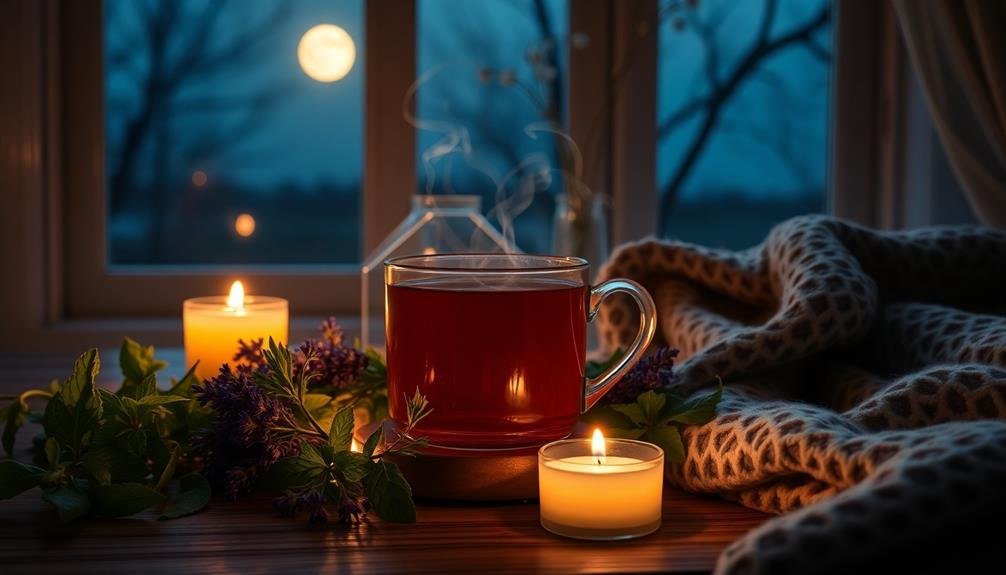
Herbal tea offers a range of benefits that can enhance your bedtime routine. When you sip on a warm cup before bed, you're not just indulging in a comforting ritual; you're also preparing your body for a good night's sleep.
Herbal teas are naturally caffeine-free, making them a perfect choice for evening relaxation. This means you won't have to worry about the jitters or restless nights that can come from caffeinated beverages.
Moreover, many herbs have calming properties that promote relaxation and help reduce stress. By incorporating herbal tea into your evening routine, you may find it easier to unwind and let go of the day's tensions.
The warmth of the tea can also soothe your digestive system, which is beneficial if you've had a heavy meal.
Additionally, the act of taking a moment to enjoy a warm beverage can signal to your body that it's time to wind down. This mindful practice can enhance your overall sleep quality, allowing you to wake up refreshed and energized.
Popular Bedtime Herbs
When looking to enhance your bedtime routine, certain herbs stand out for their soothing qualities. Chamomile is one of the most popular choices, known for its calming effects that can help reduce anxiety and promote sleepiness. You might find that a warm cup of chamomile tea eases you into a restful state.
Lavender is another favorite, renowned for its relaxing aroma and ability to lower stress levels. You can easily incorporate lavender into your tea blends for an extra touch of tranquility.
Lemon balm, part of the mint family, also offers a gentle sedative effect, making it a great option if you're seeking a peaceful night's sleep.
Valerian root is a more potent option, often used for its sleep-inducing properties. While its flavor may be strong, its benefits can be worth it.
Finally, passionflower is known for its ability to help with insomnia and anxiety, making it a great addition to your bedtime herbal mix.
With these popular bedtime herbs, you can create a soothing atmosphere that encourages relaxation and restful sleep, ensuring you drift off with ease.
DIY Herbal Tea Recipes
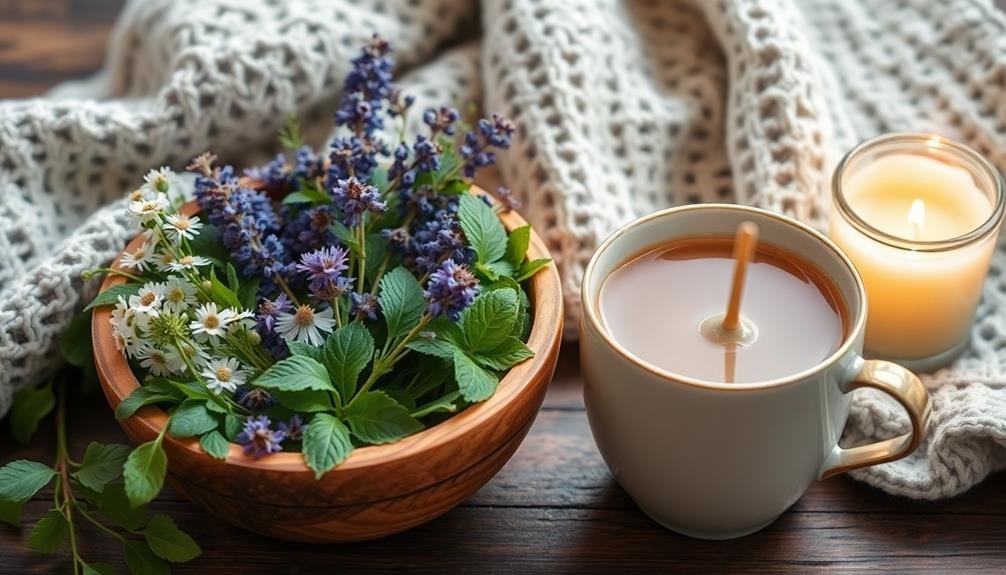
Creating your own bedtime tea blends can be a delightful way to unwind and personalize your evening routine. By mixing your favorite herbs, you can craft soothing flavors tailored to your taste and relaxation needs.
Start with a base of chamomile, known for its calming properties. Combine it with a teaspoon of dried lavender for a floral touch that helps ease stress. If you enjoy a hint of spice, add a dash of cinnamon or ginger for warmth.
For a revitalizing twist, consider incorporating peppermint or lemon balm. These herbs can brighten your blend while still promoting relaxation. A simple recipe might include two teaspoons of chamomile, one teaspoon of lavender, and a half teaspoon of peppermint.
Another option is a sweet and fruity blend. Mix equal parts of dried hibiscus and lemongrass for a tangy flavor that's caffeine-free. You might also try adding a few pieces of dried apple or a sprinkle of honey before serving.
Experiment with different ratios and combinations to find what works best for you. Enjoy the process of creating your own unique bedtime tea, and savor the calming ritual it brings to your evenings.
Brewing Techniques for Relaxation
Finding the right brewing techniques can elevate your bedtime tea experience. Start by choosing high-quality herbs, as their potency greatly influences flavor and relaxation. Measure out about one teaspoon of dried herbs per cup of water for ideal infusion.
Next, heat your water to the right temperature. Most herbal teas thrive at around 200°F (93°C), just below boiling. Pour the hot water over your herbs, ensuring they're fully submerged to extract maximum flavor. Cover the brew to keep the steam in, which helps preserve essential oils.
Let it steep for 5-10 minutes, depending on the herbs you're using. Stronger flavors like chamomile can steep longer, while lighter ones like peppermint may need less time. Taste it periodically to find your preferred strength.
Once it's ready, strain the tea into your favorite cup. Consider adding a touch of honey or a slice of lemon for added warmth and flavor.
Enjoy your tea in a calm, quiet space, allowing yourself to unwind. This simple act of brewing can set a soothing tone for your evening routine, helping you shift into relaxation.
Tips for a Restful Sleep
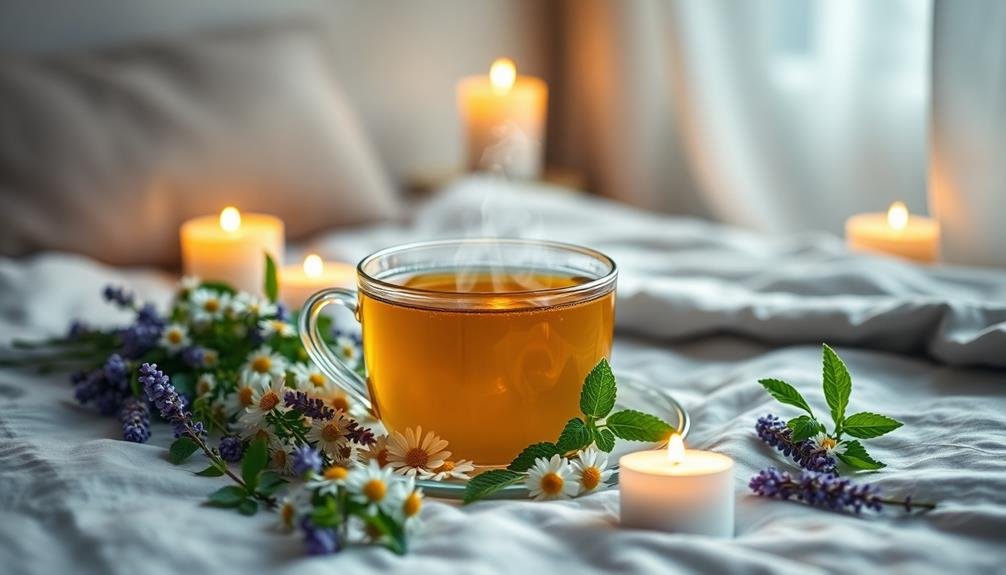
Brewing a calming bedtime tea can be a great first step toward achieving a restful night's sleep. However, there are additional tips you can integrate into your nightly routine. Creating a peaceful environment is essential; dim the lights, eliminate noise, and guarantee your bedroom is cool and comfortable. Also, establish a consistent sleep schedule by going to bed and waking up at the same time each day.
Incorporating relaxation techniques, like deep breathing or gentle stretching, can further prepare your mind and body for sleep. Avoid screens an hour before bedtime to minimize blue light exposure, which can disrupt your circadian rhythm.
Here's a simple guide to help you create the perfect sleep environment:
| Tip | Description | Benefits |
|---|---|---|
| Dim the Lights | Lower light levels to signal bedtime. | Promotes melatonin production. |
| Consistent Schedule | Go to bed and wake up at the same time. | Regulates your sleep cycle. |
| Relaxation Techniques | Try deep breathing or gentle yoga. | Reduces stress and anxiety. |
| Limit Screen Time | Avoid screens an hour before bed. | Minimizes sleep disruption. |
Implementing these tips can lead to a more restful sleep experience.
Frequently Asked Questions
Can I Use Dried Herbs Instead of Fresh Ones for Bedtime Tea?
Yes, you can use dried herbs instead of fresh ones for bedtime tea. Just remember that dried herbs are more concentrated, so you'll need less. Adjust your quantities to guarantee you get the desired flavor.
How Long Can I Store Homemade Herbal Tea Blends?
You can store homemade herbal tea blends for up to a year if kept in a cool, dark place in an airtight container. Just remember to check for any signs of moisture or spoilage before using.
Are There Any Caffeine-Free Herbal Tea Options Available?
Yes, there are plenty of caffeine-free herbal tea options available. You can enjoy chamomile, peppermint, or rooibos tea. These blends not only taste great but also help you relax before bedtime without any caffeine jitters.
Can Herbal Tea Interact With Medications or Health Conditions?
Yes, herbal tea can interact with medications or health conditions. It's important to consult your healthcare provider before trying new herbal blends, especially if you're taking prescription medications or have specific health concerns. Stay informed!
What Time of Night Is Best to Drink Bedtime Tea?
The best time to drink bedtime tea is about 30 to 60 minutes before you plan to sleep. This allows the calming effects to kick in, helping you unwind and prepare for a restful night.
In Summary
Incorporating herbal teas into your bedtime routine can transform your nights. With their calming properties and soothing flavors, these blends not only promote relaxation but also enhance your overall sleep quality. Whether you opt for popular herbs or create your own DIY recipes, brewing the perfect cup can become a cherished ritual. So, embrace these natural remedies and enjoy the restful sleep you deserve. Sweet dreams await with every sip!

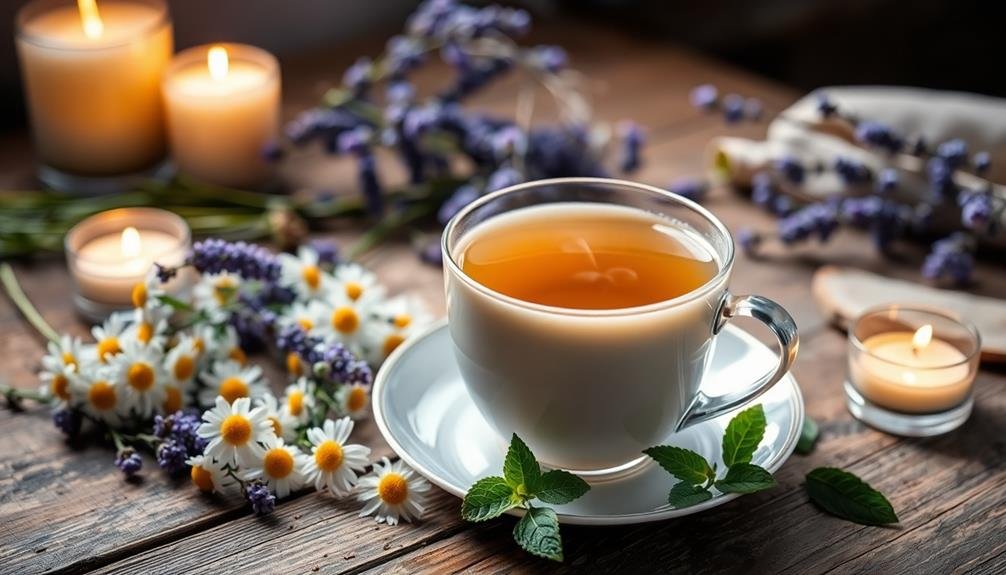
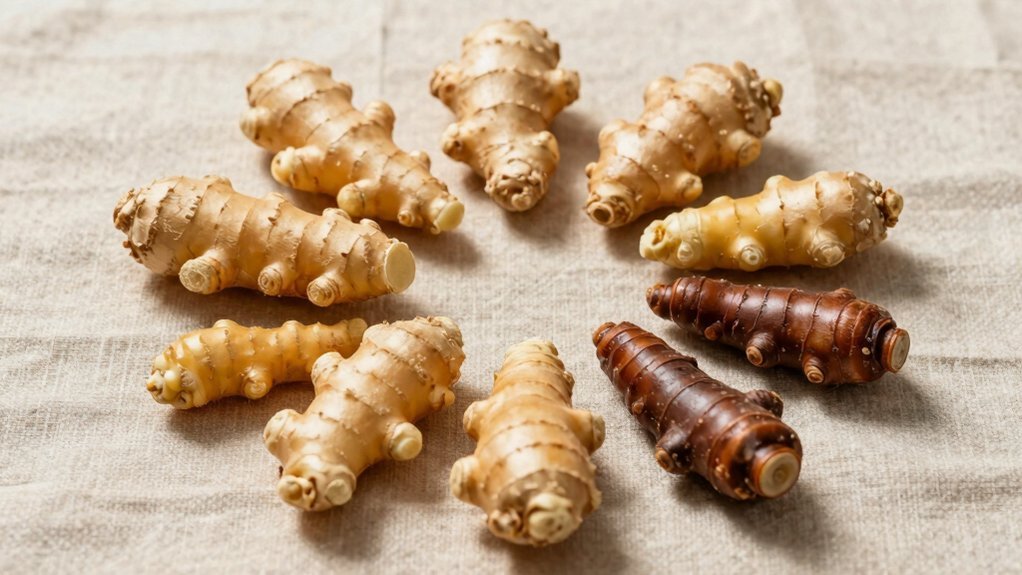
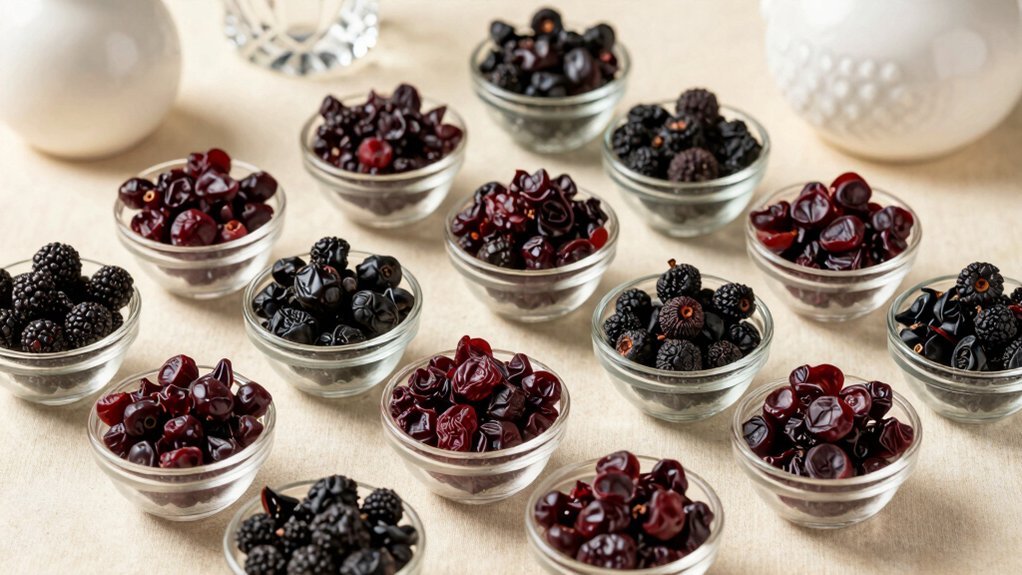
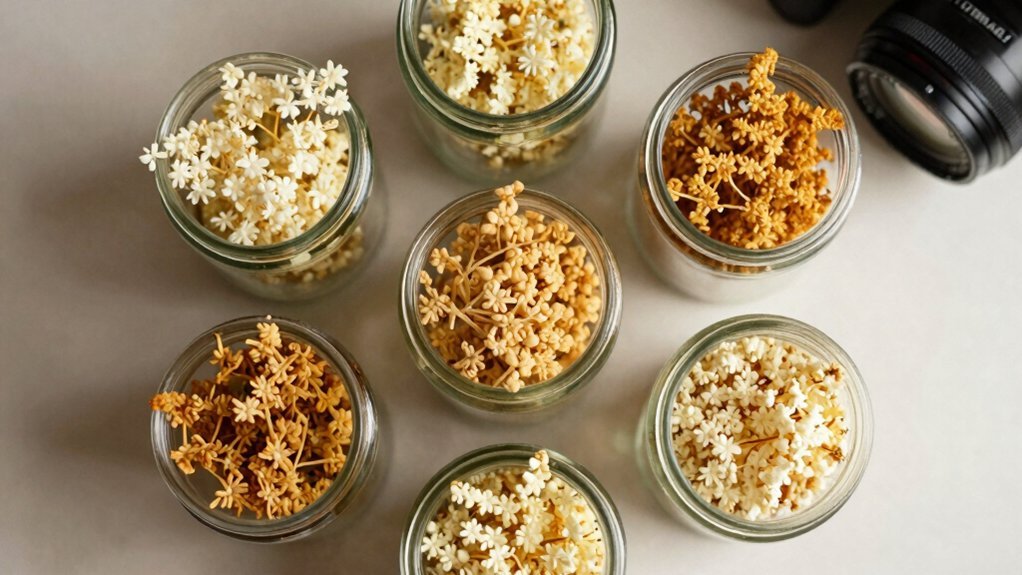
Leave a Reply